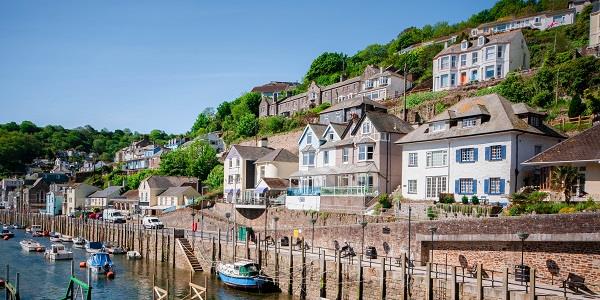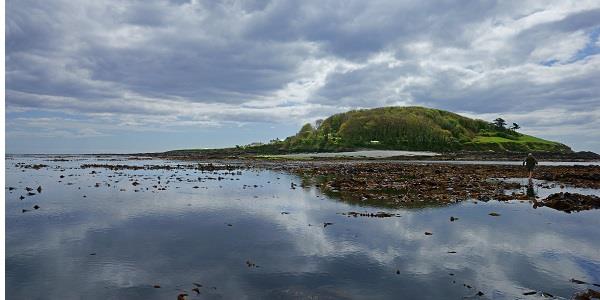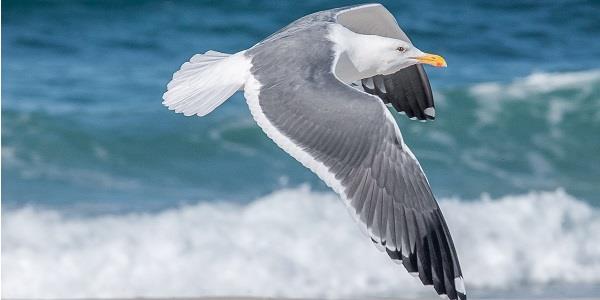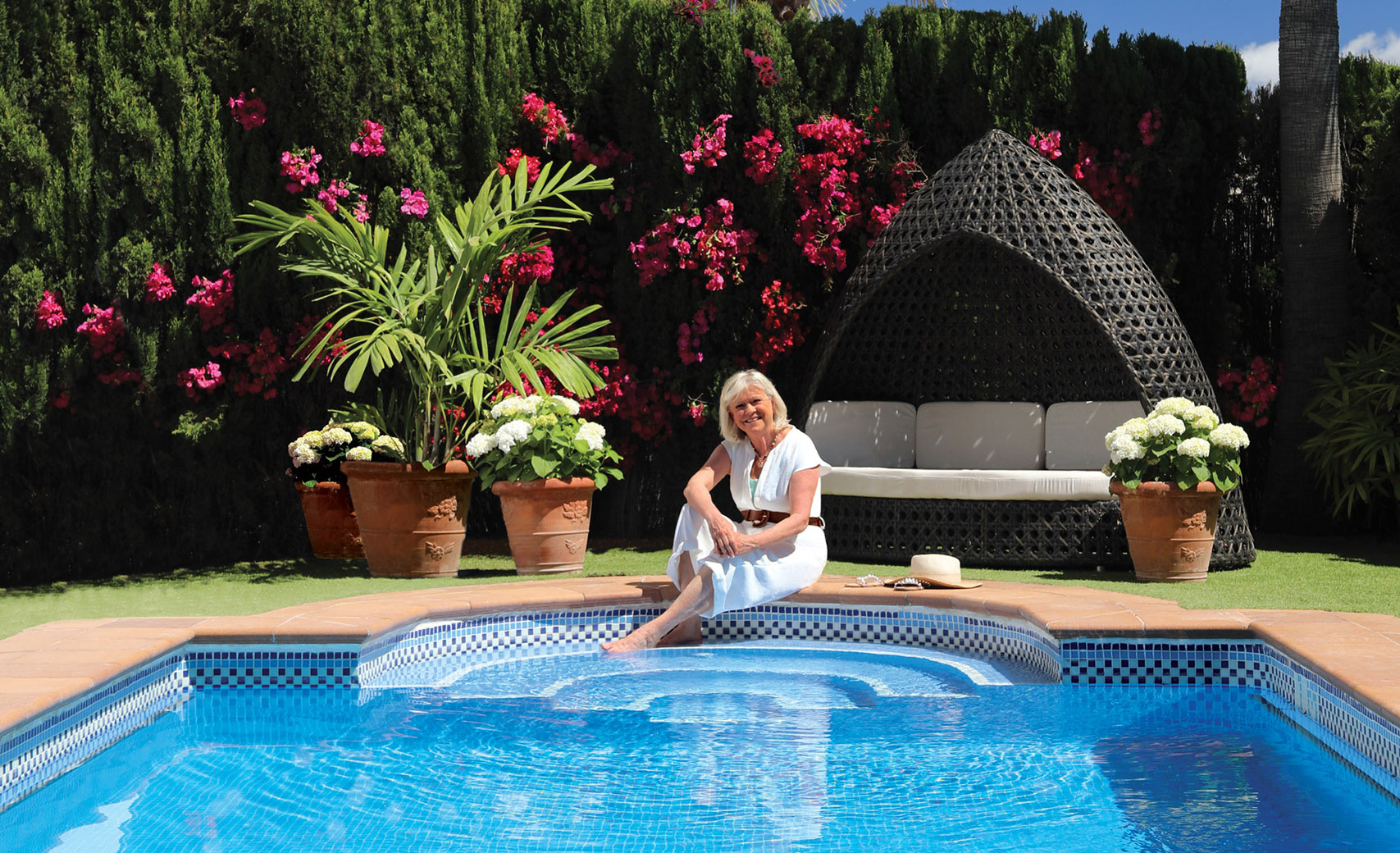
Cornwall is a haven for nature lovers. Although the Eden Project is, of course, a highlight of any Cornish adventure, it’s only the start. There are dozens of day trips available for those wishing to discover the diverse range of plant and animal life that can be found across the region. And if you happen to be staying at Duloe Manor, we have some fantastic news – the spectacular wildlife haven of Looe Island is right on your doorstep.
Simply jump in the car and head down the A387, towards the coast. In less than ten minutes, you’ll find yourself in the charming coastal town of Looe. Popular with visitors all year round, Looe is a delightful tourist destination, perfect for enjoying the beach and a portion of fish and chips, as well as a working fishing port. On top of this, the nearby rural pathways and the South West Coast Path, which also passes through the town, make Looe a great respite spot for walkers. You can find out more about the town of Looe in our previous blog.

Just offshore, however, is the town’s real treasure. Looe Island Nature Reserve is a real natural gem, and provides a quiet sanctuary for all manner of wildlife. This is thanks to the variety of habitats which can be found on its shores, including woodland, maritime, grassland, sand, shingle and rocky reef environments. The island itself is part of the Whitsand and Looe Bay Marine Conservation Zone (MCZ), and is Cornwall’s only marine nature reserve.
The history of Looe Island
Evidence suggests people have been living on Looe Island since the Iron Age. In the past, pieces of Roman amphorae, stone boat anchor and Roman coins have been found here. It was also an early Christian settlement – it was believed that as a child, Jesus visited the island with his Uncle. This made it a popular place of pilgrimage for Christians, and it soon became the site of an early chapel. It remained so until the dissolution of the Monasteries in 1536, when Looe Island became the property of the Crown.

The island was used by smugglers throughout the 17th and 18th centuries, providing them a route for avoiding the British Government’s revenue cutters in Plymouth and Falmouth. In the 20th Century, two sisters called Babs and Evelyn Atkins bought and looked after the island, writing two books on their experience. Evelyn sadly died in in 1997, and Babs continued to live there until her death in 2004. After her passing, Looe island was bequeathed to the Cornwall Wildlife Trust, who now preserve it as a nature reserve.
Reaching Looe Island
Looe island is open to visitors between Easter and the end of September every year. However, as access is carefully managed, the only way to reach the island’s shores is through an official, organised trip. The small passenger boat that ferries people to and from the island is called Moonraker, and only carries up to 11 people at a time. This means that there’s no need to worry about beating the crowds once you arrive!
The boat can access the island for two to three hours either side of high tide, as long as there is daylight and fair weather. A provisional schedule can be found on the island’s website. Alternatively, you can check the notice board in Looe itself – it’s located on Buller’s Quay in East Looe and has all the information about the crossing times for that day. You can also sign up for a trip there – the cost for an adult is £7 return boat fee and £4 landing fee, which are paid to the boatman and island employee respectively. You will board the boat from the floating pontoon near the RNLI Lifeboat station slipway in East Looe. Please note that dogs are not allowed on the island.
Exploring Looe Island
The crossing to Looe Island takes 20 minutes, after which visitors have about two hours to explore before the return journey. In order to access the island, you will need to climb over the side of the boat onto a small landing trolley, then walk across the beach and up a simple sloping path to the Tractor Shed. Here you will receive an introductory talk and be offered a copy of the trail guide, before being shown to the start of the path around the island.
This self-guided trail is less than 1km long and can be comfortably completed in around 30 minutes. By following the path, you will make your way past Smuggler’s Cottage, Island House and Jetty Cottage, before stepping onto the cliffs to admire the spectacular panoramic views. From there, make your way uphill, where you will find a small turf-roofed bird hide – perfect for spotting some of the many feathered species which make Looe Island their home. The path then leads out onto the summit, which is where the old Benedictine chapel once stood. Finally, the return path takes walkers back down the hill towards the Tractor Shed, crossing through coastal grassland and woodland on the way.

There are also several guided walks which take place around the island, and can be booked online for the price of £25. These popular walks are led by resident Cornwall Wildlife Trust wardens, who will introduce you to the fascinating nature and history of the island.
It’s worth noting that some paths on the island are steep, uneven and slippery, so we recommend wearing appropriate footwear. Although there are compost toilets on the island, there aren’t any refreshments available to buy, so make sure to bring a packed lunch. Even more importantly, make sure to take your rubbish home when you leave!
If you wish to ask any additional questions about accessibility or facilities available on the island, you can contact the warden using the details on the website.
What can you see?
As you might assume, Looe Island's relative seclusion means it’s a haven for the many birds, insects and animals which make their home there.
Firstly, the island is frequented by many nesting birds, including cormorants, shags and oystercatchers. It also has Cornwall’s largest breeding colony of great black-backed gulls. These large birds will steal food from other sea birds to keep themselves fed, although their eggs are vulnerable to carrion crows and rats. A great black-backed gull ringing project was started on Looe Island in 2010 – to date, 400 birds have been rung, and sightings have been reported as far as Spain.

In addition, most visitors will also see grey seals on the rocks at the back of the island, or swimming close into shore depending on the tide. Cornwall is home to the majority of the world’s grey seal population, over 35 species of which have been identified in Looe. The Cornwall Seal Group and volunteers regularly conduct surveys to identify the seals and learn more about them. (Don’t forget, you can also spot grey seals in near our properties in Northumberland, Pembrokeshire and Blakeney Point)

There are also several wildflower meadows being established across the island. As they grow, these are welcoming more and more species of butterflies and moths. Speckled wood, meadow brown and red admiral are the most common, and silver-washed fritillaries or the day flying hummingbird hawkmoth can also be seen feeding on plants such as red valerian.
Last but certainly not least, a small flock of Hebridean sheep have called the island home since 2006. They help with the conservation by creating and maintaining grass land structures. Their manure is also used as a fertiliser for the island, while their fleece is washed in seawater and used as an insulator.

Looe Island really is worth the trip. Whether you’re interested in the history, the wildlife, or just fancy escaping the crowds of the mainland for a few hours, you won’t be disappointed. The island is a shining example of how a precious piece of land can be nurtured and maintained for the good of everyone. If you’re spending some time at our beautiful Duloe Manor property, this little sanctuary is well worth a visit.
Like Duloe Manor, many of our properties are perfectly located for exploring some of the most spectacular sights in the local area. For more information on how you and your family can stay in our beloved Cornwall property, as well as all of our other locations in the UK or abroad, simply get in touch.

